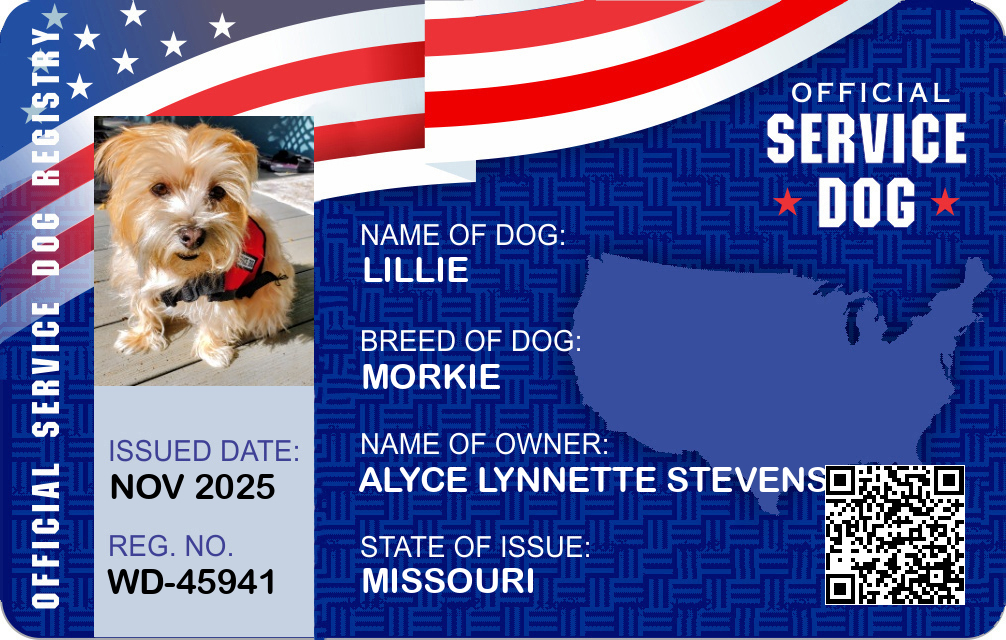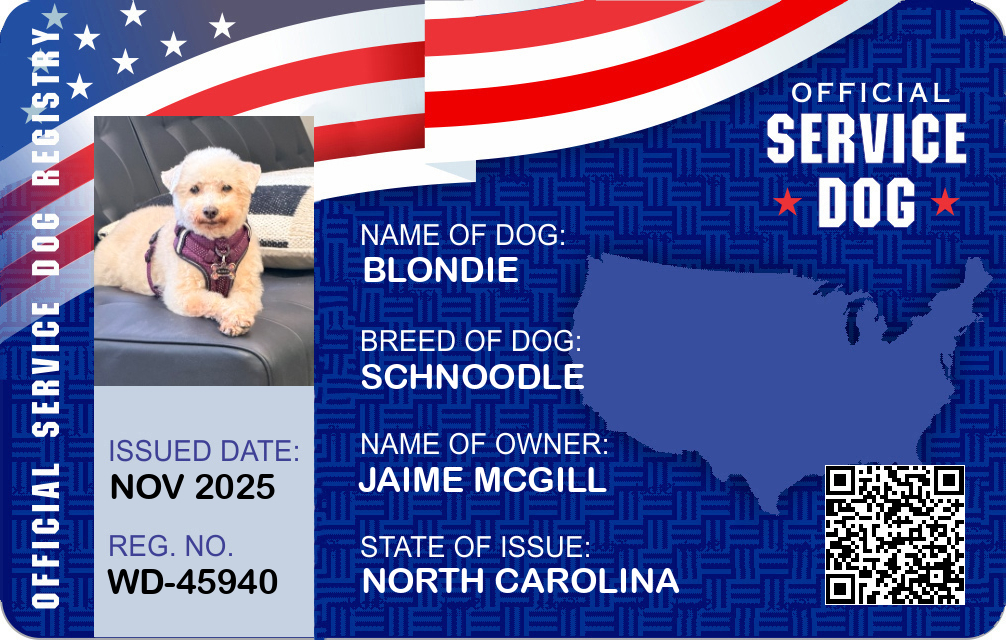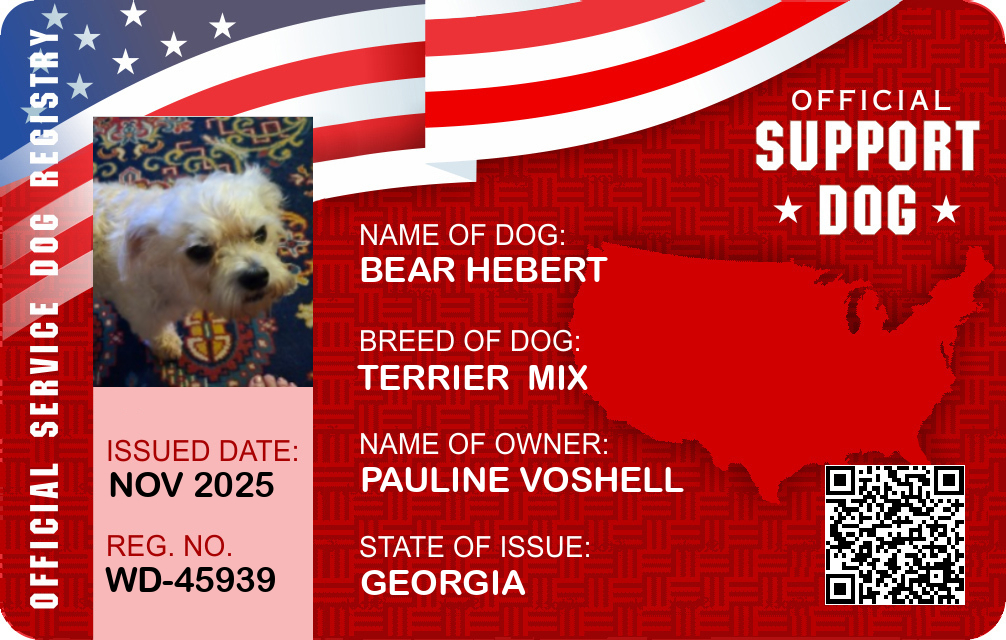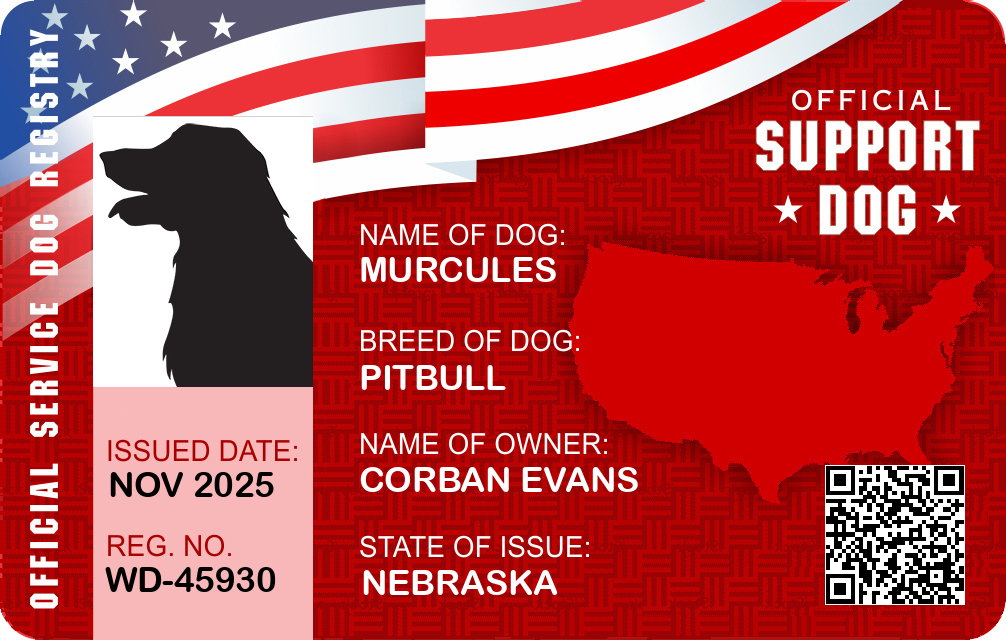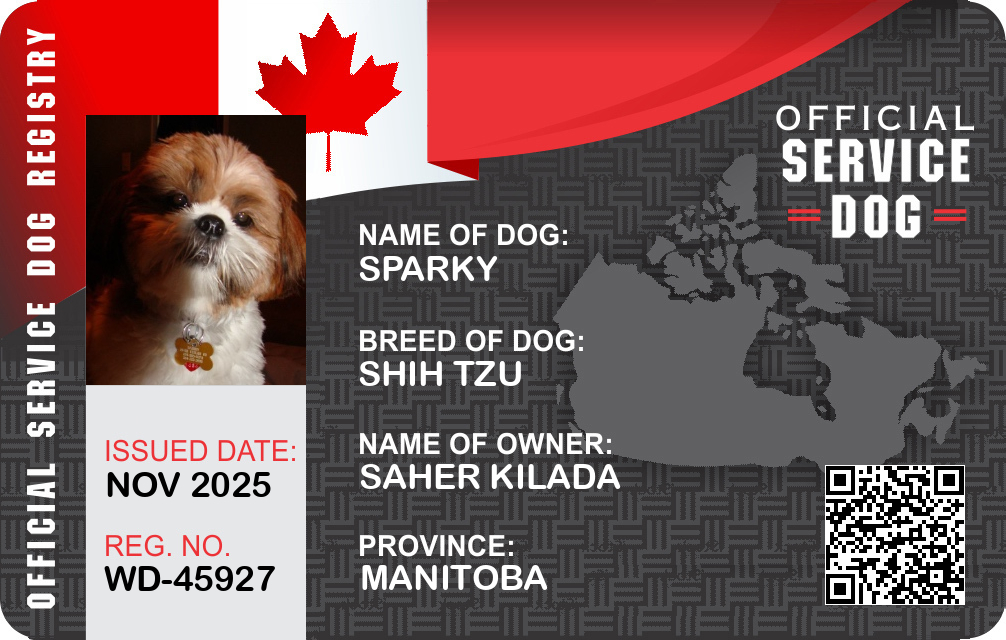Utah Service Dog Laws
Register Your Dog
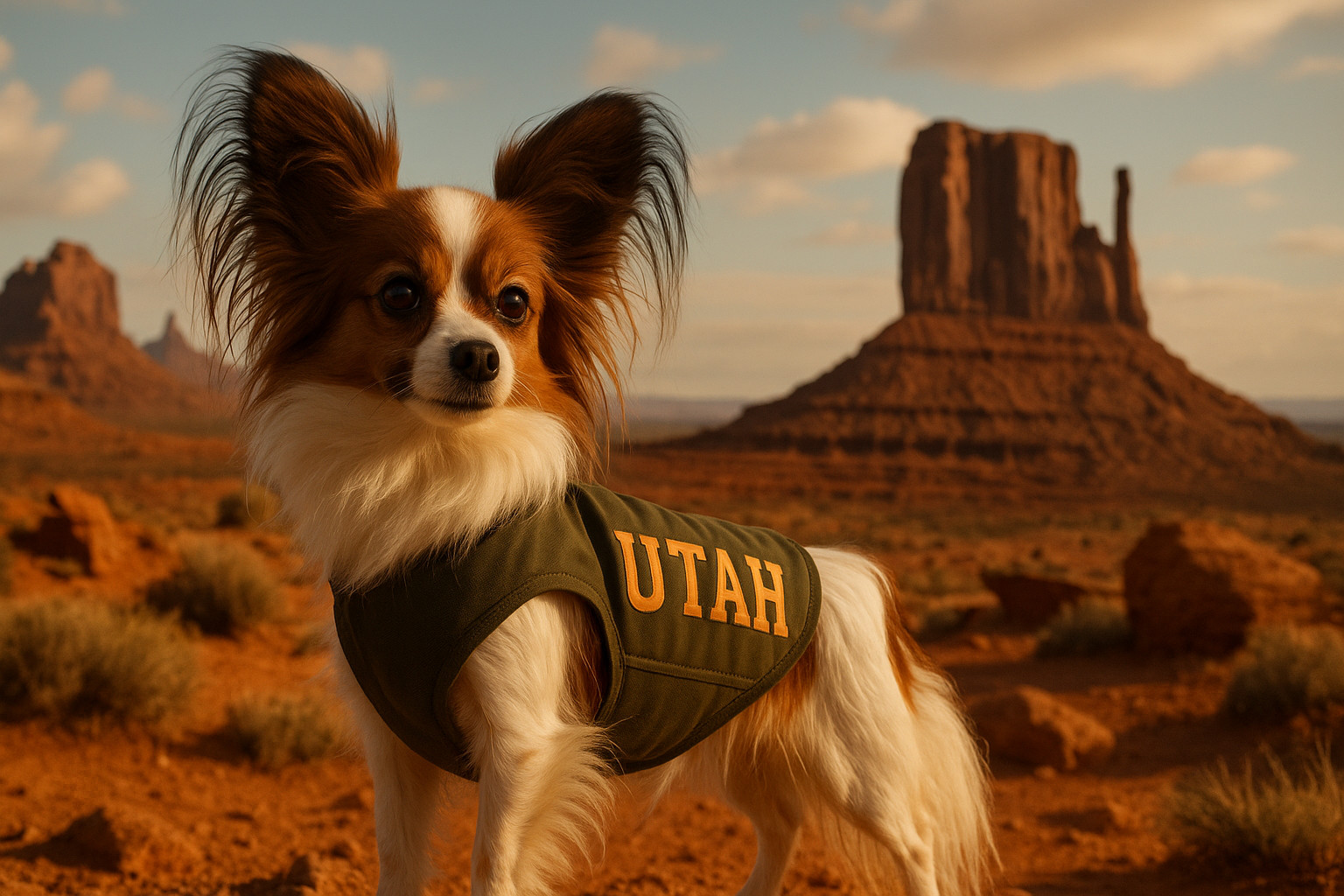
Overview of Service Dog and Legal Definitions in Utah
What is a Service Dog?
A service dog is specially trained to perform tasks and assist individuals with disabilities. Under the Americans with Disabilities Act (ADA), a service dog is defined as a dog that has been individually trained to do work or perform tasks for a person with a disability. This includes physical, sensory, psychiatric, intellectual, or other mental disabilities. Examples of tasks performed by service dogs include guiding people who are blind, alerting individuals who are deaf, pulling a wheelchair, retrieving items, alerting and protecting a person who is having a seizure, and reminding a person with mental illness to take prescribed medications. In Utah, this definition aligns closely with federal standards to ensure consistency across jurisdictions.
How Service Dogs Differ from Other Types of Assistance Animals
Service dogs differ significantly from other types of assistance animals, such as emotional support animals (ESAs) or therapy dogs. Unlike ESAs, which provide comfort by their presence but do not perform specific tasks, service dogs are trained to perform specific tasks that mitigate their handler’s disability. Therapy dogs, meanwhile, provide emotional support to many people in therapeutic settings but are not individually assigned to any one person. These distinctions are critical in determining where and how assistance animals can be accommodated under the law.
Key Federal Laws Affecting Service Dogs (e.g., ADA, FHA, ACAA)
Federal laws provide essential protections for individuals using service dogs. The ADA mandates that service animals be allowed in any place open to the public, with few exceptions. The Fair Housing Act (FHA) requires that housing providers allow service dogs (and in some cases ESAs) in housing facilities that otherwise have a “no pets” policy. The Air Carrier Access Act (ACAA) provides standards for air travel, primarily requiring airlines to transport service animals free of charge, albeit with specific conditions to ensure safety and compliance.
State-Specific Service Dog Laws in Utah
Housing Rights and Responsibilities
Utah aligns with the FHA in requiring landlords to accommodate service dogs in properties with “no pet” policies. Landlords may ask for documentation proving the need for the animal if the disability is not apparent. However, they cannot charge extra fees or deposits for service dogs, though they can charge for damage caused by the animal. It’s important for handlers to communicate openly with landlords and provide any necessary documentation promptly to avoid misunderstandings.
Public Access and Accommodation
Under both Utah law and the ADA, service dogs are allowed access to any public place, including restaurants, hotels, and stores. Business owners may ask if the dog is required due to a disability and what tasks the dog has been trained to perform but cannot request documentation or require the dog to demonstrate its tasks. This access ensures that individuals with disabilities can engage fully in public life without facing barriers due to the presence of their service dog.
Transportation and Travel Rules
Utah adheres to federal guidelines regarding the access service dogs have on public transportation and during travel. Service dogs are allowed on public transit systems without incurring additional fees. In air travel, federal regulations under the ACAA take precedence, allowing service animals to accompany passengers in the aircraft cabin. Utah encourages its citizens to familiarize themselves with airline-specific policies and documentation requirements to ensure smooth travel experiences.
Employment and Workplace Considerations
In Utah, the ADA’s provisions regarding workplace accommodation apply. Employers must allow service dogs in the workplace if they enable an employee to perform essential job functions or enjoy equal benefits and privileges of employment. Employees should engage in an interactive process with employers to determine reasonable accommodations and should be prepared to discuss how the service dog assists them in performing job duties. Documentation may be requested to substantiate the need, although employers must maintain confidentiality regarding any personal medical information shared during this process.
Documentation, Requirements, and Processes in Utah
Service Dog Documentation and Who Can Issue It
Unlike ESAs which may require a letter from a healthcare provider, service dogs do not need certification or registry under the ADA or Utah state law. However, trainers or recognized agencies may provide training documentation as additional support when co
nfirming a dog’s service status, although it should not be formally required by businesses or housing providers.Landlord, Business, and Provider Verification Rules
While landlords and businesses in Utah are limited in what they can request from service dog handlers, they can ask only two questions: whether the dog is required because of a disability, and what tasks the dog is trained to perform. They cannot require documentation, demand proof of certification, or charge fees for service dogs. These rules are designed to protect the privacy and rights of individuals with service dogs, ensuring their independence and dignity are not compromised.
Rights, Limitations, and Legal Risks
Rights Service Dog Handlers Have in Utah
Service dog handlers in Utah enjoy extensive rights, such as public access, housing without discrimination or additional fees, and workplace accommodation. These rights ensure that individuals with disabilities are not unfairly excluded from participating in community life, market economies, and social structures due to their reliance on a service dog.
Limits on Service Dog Protections and Common Restrictions
Despite extensive protections, certain limits apply. For instance, if a service dog’s behavior infringes on the health and safety of others, such as through aggressive behavior, businesses can legally ask the handler to remove the dog. Additionally, service dogs are not permitted in areas where their presence would compromise the integrity or safety of a sterile environment, such as certain hospital settings.
Penalties for Fraud or Misrepresentation
Misrepresenting an animal as a service dog when it does not meet the legal definition can result in legal consequences. In Utah, falsely representing an animal as a service dog can lead to fines and potential criminal charges. These penalties aim to preserve the integrity of service dog provisions and ensure that those with genuine needs are not impeded by public skepticism.
Practical Guidance for Service Dog Handlers in Utah
How to Qualify for a Service Dog Legitimately
To qualify for a service dog in Utah, individuals must have a recognized disability and a requirement for a dog trained to perform specific tasks related to that disability. Engaging with a professional service dog training organization or a trainer familiar with federal and state requirements is pivotal. Documentation of the disability from a healthcare provider, although not obligatory for the dog itself, supports claims where the impairment is not visible.
How to Talk to Landlords, Airlines, and Employers
Effective communication is crucial for handlers of service dogs. For landlords, providing clear documentation of the need and willingness to answer questions can preemptively resolve issues. In employment, discussing needs with HR and managers as early as possible ensures that the workplace is prepared to integrate the service dog. For air travel, contacting the airline at least 48 hours in advance allows time for any necessary preparations.
Summary of Service Dog Laws in Utah
In sum, Utah’s service dog laws intertwine with federal laws to ensure inclusivity and accessibility for individuals with disabilities. While handlers have significant rights in housing, public access, travel, and employment, they should also understand the boundaries and requirements of these rights to reduce conflict. Ultimately, service dogs play a vital role in providing independence, dignity, and increased quality of life for their handlers.
Summary of Key Rights and Considerations for Service Dog Handlers in Utah:
- Service dogs must be trained to perform specific tasks that aid a person with disabilities, distinct from emotional support animals.
- Utah adheres to federal guidelines (ADA, FHA, ACAA) in upholding rights for service dog handlers in public access, housing, and employment.
- Employers and housing providers must allow service dogs without extra fees, requesting only necessary documentation for non-apparent disabilities.
- Transportation systems and airlines permit service dogs, although air carriers may have specific documentation procedures – plan accordingly.
- Avoid misrepresenting pets as service dogs to prevent legal penalties, including fines or charges.
- Documentation from healthcare providers may support disability claims, despite the absence of formal service dog certification requirements.
- Open, early communication with landlords, employers, and airlines ensures smoother interactions and reduces potential conflict.



